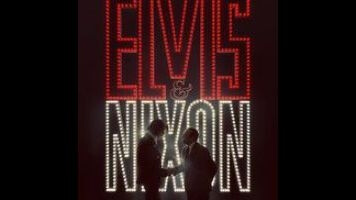
Movie biographies tend to turn on epic, stunt-like impersonations of famous figures by other famous figures. Elvis & Nixon performs the ritual of stunt-casting impressions twice, and with such looseness that it almost plays like a spoof. Liza Johnson’s film purports to tell the story behind the famous photograph of singer Elvis Presley and President Richard Nixon, taken a few days before Christmas in 1970, but the historical record doesn’t offer all that much to work with. Frankly, the ahistorical non-record doesn’t really support a feature film, either. Elvis & Nixon’s play-by-play of the eponymous figures and their underlings negotiating and carrying out Presley’s impulsive, unsolicited visit stretches its 86-minute running time thin.
The film’s vantage skews toward Elvis, who decides in the film’s opening minutes that he can do his part to fight America’s encroaching drug and hippie epidemic. (These motivations are mostly unquestioned by the film’s screenplay, whose three authors include actor Cary Elwes.) Michael Shannon is thinner but less smoothly handsome than Elvis circa 1970, and his speaking voice, even accented, is reedier. Kevin Spacey, for his part, is actually less scowling (and jowly) than the real Nixon; these are not impressions for the ages, or even for Saturday Night Live. But both actors are fun to watch, and Shannon in particular has a way of carrying his body and gesturing with his hands that possess a superstar’s bizarre, borderline entitled aura. Spacey also does a lot of work with his hands; at certain points the actors could be casting spells at each other.
Johnson previously worked with Shannon on the under-seen coming-home drama Return, where he surprisingly played the stable spouse rather than the war-damaged veteran. Apart from an affinity for the gentler side of frequent onscreen madman Shannon, she carries over from Return an abiding sensitivity to her characters. Put together, Presley and Nixon’s fear of the cultural other, overall defensiveness, and faux-populism forms an ideology that plays almost like a nascent version of today’s Trump-level campaigns. But Johnson takes time to notice their less bigoted dimensions. She includes a scene of Presley rehearsing for his presidential chat by talking to himself about his stillborn twin, while Nixon has a moment to bear his (bitter) soul about his physical insecurities; unlike Presley, he notes, he was not born a handsome man. When it looks like the meeting may not happen, Presley’s feelings are hurt, and Nixon eventually proceeds out of love for his daughter, an Elvis fan.
These moments of sweetness, though, can’t quite sustain a whole movie. The underlings on both sides—Colin Hanks and Evan Peters for Nixon; Johnny Knoxville and Alex Pettyfer for the King—experience only token developments, none more token than Pettyfer’s inconsequential personal issues about whether he can step out of Presley’s shadow. There are little moments that sparkle, like the way Hanks can’t help but do an Elvis impression when reading the singer’s letter to the president aloud, but the details don’t accumulate into real substance. Similarly, a few striking images, like Elvis striding down the White House hall, passing some unidentified dignitaries walking in the opposite direction, don’t give the material a full visual scheme. Mostly, it presents the early ’70s as washed out and slightly soft—the generic look of semi-recent history, in other words. As much as the movie sidesteps biographical conventions with its narrow frame and playful tone, it can’t avoid a separate cliché that plagues this sort of material: Elvis & Nixon is basically a diverting TV movie given a theatrical release.